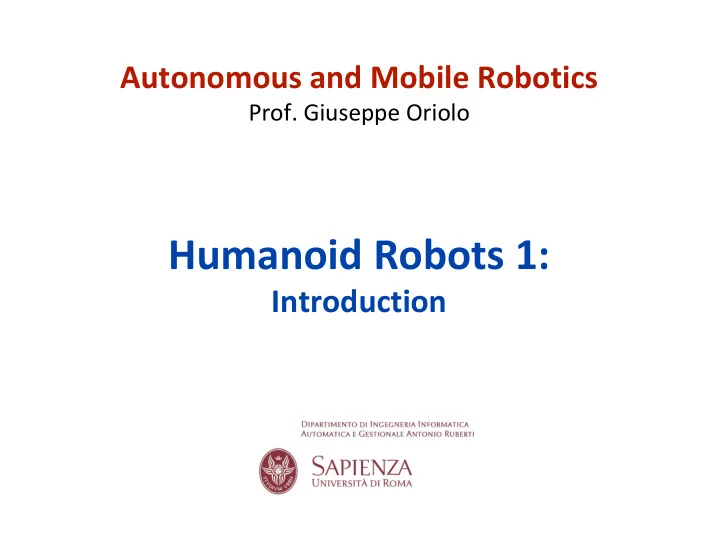

Autonomous and Mobile Robotics Prof. Giuseppe Oriolo Humanoid Robots 1: Introduction
why humanoids • practical reasons: in many cases humanoids are the most sensible choice • psychological and commercial reasons: humanoids have a major appeal Oriolo: Autonomous and Mobile Robotics - Humanoid Robots 1 2
why humanoids • multipurpose: sensing, manipulation, locomotion etc … • adaptability: humanoids can work in environments suitable for humans and expand their capabilities by using machines designed for humans • collaboration: humanoid motion is easy for humans to understand and predict • human-like appearance: empathy Oriolo: Autonomous and Mobile Robotics - Humanoid Robots 1 4
some history • pre-research period: humans always fascinated by the idea of building anthropomorphic machines • pioneering period (1970s-1990s): initial research on biped prototypes • new millennium: industrial companies showed that building actual humanoids was possible • today: research focusing on humanoid robustness, efficiency and versatility Oriolo: Autonomous and Mobile Robotics - Humanoid Robots 1 5
pre-research period Hero’s Automata Karakuri Dolls (1st century) (17th – 19th century) 1500 0 1700 1900 Leonardo’s Robot Asimov’s Laws of Robotics (1495) (1942) Oriolo: Autonomous and Mobile Robotics - Humanoid Robots 1 6
pioneering period P2 WABOT-1 WL-10RD (Honda, 1996) (Kato, 1984) (Kato, 1973) 1970 1980 1990 2000 ZMP concept Purely passive dynamics (Vukobratović, 1972) (McGeer, 1990) First computer-controlled robot (Raibert, 70s-80s) Oriolo: Autonomous and Mobile Robotics - Humanoid Robots 1 7
new millennium iCub (IIT, 2009) NAO QRIO (Aldebaran, 2005) (Sony, 2003) CoMan (IIT, 2012) ASIMO (Honda, 2000) 2004 2012 2000 2002 2006 2008 2010 DARwIn-OP (Robotis) HRP-2 REEM-B HRP-4 Romeo (Kawada, 2002) (Pal Robotics, 2008) (AIST, 2013) (Aldebaran, 2013) Oriolo: Autonomous and Mobile Robotics - Humanoid Robots 1 8
today ATLAS (Boston Dynamics) TORO (DLR) Oriolo: Autonomous and Mobile Robotics - Humanoid Robots 1
not only walking running jumping Oriolo: Autonomous and Mobile Robotics - Humanoid Robots 1
whole-body control Oriolo: Autonomous and Mobile Robotics - Humanoid Robots 1
basic terminology Center of Mass arm (moving point) torso leg knee Zero Moment Point (moving point) ankle Oriolo: Autonomous and Mobile Robotics - Humanoid Robots 1 12
human walking: analysis Oriolo: Autonomous and Mobile Robotics - Humanoid Robots 1 13
basic terminology SP Double Support Single Support • walking: cyclic alternation of 4 phases • Support Polygon (SP): convex hull of the contact points • robots with flat feet have only Single and Double Support phases Oriolo: Autonomous and Mobile Robotics - Humanoid Robots 1 14
gaits • static(ally stable) gait: the projection of the CoM on the ground is always inside the SP • however, static gaits are very slow and conservative • Zero Moment Point (ZMP): point on the ground where the resultant of the reaction forces acts (more on this later) • dynamic(ally stable) gait: the ZMP is always inside the SP Oriolo: Autonomous and Mobile Robotics - Humanoid Robots 1 15
gaits static walk dynamic walk Oriolo: Autonomous and Mobile Robotics - Humanoid Robots 1 16
passive (dynamic) walkers • energy-efficient, natural gait (limit cycle) • does not work on horizontal ground • limited agility and responsiveness of motion Oriolo: Autonomous and Mobile Robotics - Humanoid Robots 1 17
active (dynamic) walkers • actuated joints (energy consumption) • feedback control needed • robots with flat feet or non-trivial feet Oriolo: Autonomous and Mobile Robotics - Humanoid Robots 1 18
Recommend
More recommend